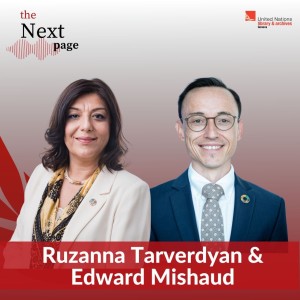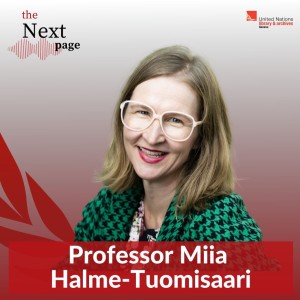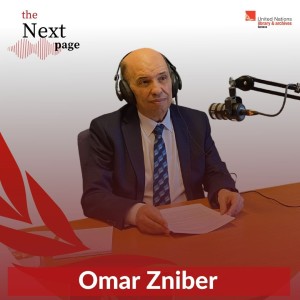The Next Page
Are you curious about the power of international cooperation? And how it affects our future? Tune in to the #NextPagePod, the podcast of the UN Library & Archives Geneva, designed to advance the conversation on multilateralism.
Are you curious about the power of international cooperation? And how it affects our future? Tune in to the #NextPagePod, the podcast of the UN Library & Archives Geneva, designed to advance the conversation on multilateralism.
Episodes

Wednesday Nov 16, 2022
Wednesday Nov 16, 2022
Cet épisode poursuit notre série de conversations avec des Représentants permanents auprès de l'Office des Nations Unies à Genève, où nous explorons leurs points de vue en tant que diplomates dans le système multilatéral et ce que l'ONU signifie pour eux aujourd'hui.
Clara Manuela da Luz Delgado Jesus, Représentante permanente et Ambassadeur extraordinaire et plénipotentiaire du Cap-Vert auprès de l'Office des Nations Unies à Genève et d'autres organisations internationales rejoint le directeur de la Bibliothèque & Archives, Francesco Pisano et notre collège Adriano Goncalves e Silva, pour cette conversation bilingue en français et en portugais sur le Cap-Vert. Le Cabo Verde a fait partie des Nations Unies depuis 1975 et a siégé au Conseil de Sécurité une fois comme membre de l’ONU.
Madame l’Ambassadeur raconte le parcours du Cabo Verde, ainsi que son rôle dans la région et dans le monde, tout en partageant son propre parcours dans la diplomatie. Elle parle de l'importance de la coopération multilatérale aujourd'hui.
Ressources
Où écouter cet épisode
Apple podcasts: https://podcasts.apple.com/us/podcast/the-next-page/id1469021154
Spotify: https://open.spotify.com/show/10fp8ROoVdve0el88KyFLy
Youtube: (1) Le Cap-Vert et la coopération multilatérale. Une conversation avec Madame l’Ambassadeur Clara Manuel - YouTube
Contenu
Intervenants : S.E. Madame Clara Manuela da Luz Delgado Jesus,Francesco Pisano et Adriano Goncalves et Silva
Réalisation et montage : Amy Smith
Conception pour réseaux sociaux : Ana Hauert
Enregistrée et réalisé à la Bibliothèque & Archives des Nations Unies à Genève

Friday Nov 04, 2022
Polylateralism and Preparing for the Future, with Dr. Randolph Kent
Friday Nov 04, 2022
Friday Nov 04, 2022
The global challenges we face today are often complex, inter-connected and inter-related. How, as a global community, can we prepare for the global threats of the future? In this episode of the #NextPagePod, we speak with Dr. Randolph Kent about his research on future global crises, and why he thinks polylateralism is needed to face them collectively.
D. Kent is the Director of the Humanitarian Futures Initiative, Visiting Professor at the African Leadership Centre at King’s College London, and Senior Associate Fellow at the Royal United Services Institute, where he works on an initiative called the Futures Project. His past roles include several in the humanitarian sector of the UN system, including as UN Resident and Humanitarian Coordinator for Somalia (2002), UN Humanitarian Coordinator in Kosovo (1999), UN Humanitarian Coordinator in Rwanda (1994-1995), and emergency and preparedness roles in Sudan and Ethiopia.
Dr. Kent speaks with us about his experiences in the UN, and how they've shaped his work today in futures thinking and polylateralism. What is futures methodology and should it matter for the UN and multilateralism? What exactly is polylateralism, and why does he think it's necessary to better meet global crises as an international community? Let's find out.
Resources
Read Dr. Kent's report "Building an International Architecture for Managing Global Threats": https://rusi.org/explore-our-research/publications/emerging-insights/building-international-architecture-managing-global-threats
Learn more about Humanitarian Futures: https://www.humanitarianfutures.org/
Listen to the #NextPagePod episode with historian Margaret MacMillan as she speaks about the shaping of modern multilateralism: https://unitednationslibrarygeneva.podbean.com/e/episode-32-margaret-macmillan/
Where to listen to this episode
Apple podcasts: https://podcasts.apple.com/us/podcast/the-next-page/id1469021154
Spotify: https://open.spotify.com/show/10fp8ROoVdve0el88KyFLy
Youtube: https://www.youtube.com/watch?v=Udgjtu1vB7U
Content
Speakers: Dr. Randolph Kent
Host: Natalie Alexander
Editor & Producer: Natalie Alexander
Social media designs: Natalie Alexander & Alma Selvaggia Rinaldi
Recorded & produced at the United Nations Library & Archives Geneva

Friday Oct 21, 2022
Friday Oct 21, 2022
Today's episode delves into data. It’s all around us in our daily lives, but how important is data for multilateralism today? Especially, as we look to Agenda 2030, and measuring our progress to achieve the Sustainable Development Goals (the SDGs)?
The #NextPagePod is joined by Ruzanna Tarverdyan, Founding President of the Geneva Consensus Foundation, and author of the book, “Measuring sustainable development goals performance”, as well as Edward Mishaud, Acting Director of the SDG Lab at UN Geneva.
How can we really measure if we’re achieving the SDGs? Are countries’ ready to integrate the social, economic and environmental dimensions of development? What does the data tell us about crises, and our ability to face future challenges? And how can science impact multilateralism? We explore these questions in this episode.
Resources
Learn about the book “Measuring sustainable development goals performance”, by Ruzanna Tarverdyan & Sten Thore.
Read the article from the Official Journal of the European Union entitled "Opinion of the European Economic and Social Committee on Listening to the citizens of Europe for a sustainable future" (Sibiu and beyond)’ adopted in 2019 when the European Economic and Social Committee chose to use Ruzanna Tarverdyan & Sten Thore's definition of the notion “Sustainable Competitiveness”.
Visit SDG Lab website: https://www.sdglab.com/
Visit the UN Sustainable Development Goal indicators website
Listen to the #NextPagePod series collaboration with the SDG Lab at UN Geneva, It Takes A Global Crisis on YouTube or here on Podbean.
Where to listen to this episode
Apple podcasts: https://podcasts.apple.com/us/podcast/the-next-page/id1469021154
Spotify: https://open.spotify.com/show/10fp8ROoVdve0el88KyFLy
Youtube: https://www.youtube.com/watch?v=DugVc5uUABU
Content
Speakers: Ruzanna Tarverdyan & Edward Mishaud
Host: Natalie Alexander
Editors & Producers: Alma Selvaggia Rinaldi & Natalie Alexander
Social media designs: Alma Selvaggia Rinaldi & Natalie Alexander
Recorded & produced at the United Nations Library & Archives Geneva

Friday Sep 30, 2022
Friday Sep 30, 2022
Join us with our guest, Ann Morgan, an author, editor, Royal Literary Fund Fellow, TED speaker, literary activist, based in the U.K., for a conversation on the power of stories to connect us. At the heart of the UN Library & Archives Geneva is its mission to promote international understanding.
We reached out to Ann Morgan to tell us more about her ongoing adventure of Reading the World and how reading literature from different places can help us embrace the unknown, suspend judgement and avoid jumping to fill the gaps, so that we can move from incomprehension to understanding and take part in the richness and joy of the shared experience of a story.
In this episode, we consider how reading the world’s literature can help us develop the sort of cross-cultural communication skills that are necessary for diplomacy and multilateralism.
Resources
The List: https://ayearofreadingtheworld.com/thelist/
Photo credit: Igor Emmerich
Books:
Morgan, A. (2022) Reading the World: How I Read a Book from Every Country. Harvill Secker/Random House (UK Edition)
Morgan, A. (2015) The World Between Two Covers: Reading the Globe. Liveright/Norton (US Edition)
Morgan, A. (2016) Beside Myself. Bloomsbury Publishing
Website: https://ayearofreadingtheworld.com/
TED talk: https://www.ted.com/talks/ann_morgan_my_year_reading_a_book_from_every_country_in_the_world?language=en
Where to listen to this episode
Apple podcasts: https://podcasts.apple.com/us/podcast/the-next-page/id1469021154
Spotify: https://open.spotify.com/show/10fp8ROoVdve0el88KyFLy
Youtube: https://youtu.be/kJN3NTf6Yok
Content
Speakers: Ann Morgan
Host: Amy Smith
Editors & Producers: Amy Smith
Social media designs: Natalie Alexander & Alma Selvaggia Rinaldi
Recorded & produced at the United Nations Library & Archives Geneva

Friday Sep 09, 2022
How Anthropology Helps Us Understand Multilateralism
Friday Sep 09, 2022
Friday Sep 09, 2022
In this episode of the #NextPagePod, we are joined by Professor Miia Halme-Tuomisaari, Associate Professor in Human Rights studies at Lund University in Sweden, and Research Associate at the Global Governance Centre at the Geneva Graduate Institute.
Professor Halme-Tuomisaari is a social anthropologist with a background in international law, whose focus is on the study of the contemporary human rights phenomenon.
Why does anthropology matter to the study of International Organisations and multilateralism? Our Director at the UN Library and Archives Geneva, Francesco Pisano, joins Professor Halme-Tuomisaari to find out what her research reveals.
Resources
Visit Professir Halme-Tuomisaari's website: https://miiahalmetuomisaari.net/, as well as her Instagram https://www.instagram.com/observari/ and Twitter: https://twitter.com/HalmeTuomisaari
Visit the Allegra Lab website: https://allegralaboratory.net/
Where to listen to this episode
Apple podcasts: https://podcasts.apple.com/us/podcast/the-next-page/id1469021154
Spotify: https://open.spotify.com/show/10fp8ROoVdve0el88KyFLy
Youtube:
Content
Speakers: Miia Halme-Tuomisaari
Host: Francesco Pisano
Editors & Producers: Alma Selvaggia Rinaldi & Natalie Alexander
Social media designs: Alma Selvaggia Rinaldi & Natalie Alexander
Recorded & produced at the United Nations Library & Archives Geneva

Friday Jul 22, 2022
Friday Jul 22, 2022
In this episode of the #NextPagePod, we are joined by Professor Thomas G. Weiss, of the CUNY Graduate Center, a renowned researcher of the United Nations secretariat and the UN system at large. Our Director at the UN Library and Archives Geneva, Francesco Pisano, explores with Professor Weiss one of his latest books, Would the World Be Better without the UN?
In his early career, he served with various parts of the UN Secretariat and UN specialised agencies. He has published countless works on the UN system, international relations, humanitarian affairs and peacekeeping.
Resources
Transcript: http://bitly.ws/t7zg
Where to listen to this episode
Apple podcasts: https://podcasts.apple.com/us/podcast/the-next-page/id1469021154
Spotify: https://open.spotify.com/show/10fp8ROoVdve0el88KyFLy
Youtube: https://www.youtube.com/watch?v=tc2iLBRbHEU
Content
Speakers: Thomas Weiss
Host: Francesco Pisano
Editors & Producers: Alma Selvaggia Rinaldi, Yunshi (Daisy) Liang, Natalie Alexander
Social media designs: Alma Selvaggia Rinaldi & Natalie Alexander
Recorded & produced at the United Nations Library & Archives Geneva

Friday Jul 08, 2022
Friday Jul 08, 2022
Aujourd'hui, la Cheffe de la Section de la mémoire institutionnelle à la Bibliothèque et aux Archives de l'ONU à Genève, Blandine Blukacz-Louisfert, est rejointe par Sandrine Kott, Professeur d'histoire contemporaine à l'Université de Genève et professeur invitée à la New York University, pour la présentation de son ouvrage Organiser le Monde, une Autre Histoire de la Guerre Froide apparu en 2021 aux éditions du Seuil.
Sandrine Kott est spécialiste de l'histoire du travail et des politiques sociales. Ses travaux récents se sont intéressés plus particulièrement aux organisations internationales comme lieu de circulation des savoirs et expertises en matière économique et sociale.
Dans cet ouvrage, Kott s’intéresse aux organisations internationales et ce qu’elles peuvent révéler sur la période de la guerre froide. Elle souligne également l’importance des archives dans l’analyse de l’histoire, ainsi que ce que cela révèle sur les origines et les fonctionnements du multilatéralisme. Enfin, elle souligne également l’importance de Genève dans l’histoire du multilatéralisme, ainsi que ce que cette tradition multilatérale signifie aujourd’hui.
Ressources
Transcript: https://libraryresources.unog.ch/audio/transcripts/Organiser-le-Monde-une-Autre-Histoire-de-la-Guerre-Froide-avec-Sandrine-Kott
Kott, S. (2021). Organiser le Monde, une Autre Histoire de la Guerre Froide, Seuil. https://www.seuil.com/ouvrage/organiser-le-monde-sandrine-kott/9782021408669
Où trouver cet épisode
Apple podcasts: https://podcasts.apple.com/us/podcast/the-next-page/id1469021154
Spotify: https://open.spotify.com/show/10fp8ROoVdve0el88KyFLy
Youtube: http://bitly.ws/sGHo
La Bibliothèque et Archives des Nations unies à Genève
Facebook: https://www.facebook.com/UNOGLibrary
Twitter: https://twitter.com/UNOGLibrary
Contenu
Intervenants: Sandrine Kott
Animatrice: Blandine Blukacz-Louisfert
Réalisation et montage: Alma Rinaldi & Natalie Alexander
Design des réseaux sociaux : Alma Selvaggia Rinaldi
Transcription: Alma Selvaggia Rinaldi
Enregistré et produit à la Bibliothèque & Archives des Nations Unies à Genève

Friday Jun 24, 2022
Friday Jun 24, 2022
Marieke Louis and Lucile Maerten’s book, Why International Organizations Hate Politics: Depoliticizing the World, draws on the extensive literature on functionalism and the related topic of technocracy, on anti-politics and bureaucractic multilateralism, and the wider, crosssectional research on expertise, knowledge and technicization, to systematically analyse and shine new light on the less explored topic of depoliticization.
Through current and historical case studies they examine behind the facades to reveal the common structures, mechanisms and logics of the depoliticization process at work and point to the unintended consequences and impacts on the very issues that IOs were created to address.
Their argument is carefully constructed and very nuanced and they invite us to consider their whole book and to question everyday practices that may, as they say, “backlash”.
Marieke Louis is Associate Professor in Political Science and International Relations at Sciences Po Grenoble, PACTE, University Grenoble Alpes. Lucile Maertens is Senior Lecturer in Political Science and International Relations at IEP / CRHIM, University of Lausanne.
Resources
• Transcript: http://bitly.ws/sBna
• Louis, M. & Maertens, L. (2021). Why International Organizations Hate Politics. https://www.taylorfrancis.com/books/oa-mono/10.4324/9780429466984/international-organizations-hate-politics-marieke-louis-lucile-maertens
• Finnemore, M. and Barnett, M.N. (2004) Rules for the world: international organizations in global politics. Cornell University Press.• Hay, C. (2007) Why we hate politics (Vol. 5). Polity. • Hay, C. (2014) “Depoliticisation as Process, Governance as Practice: What Did the ‘First Wave’ Get Wrong and Do We Need a ‘Second Wave’ to Put it Right?,” Policy and Politics 42, no. 2. 293–311.• Human Development Index. UNDP. https://hdr.undp.org/data-center/humandevelopment-index#/indicies/HDI • Keohane, R. O. (1978) “The Functional Theory of Politics. By David Mitrany. (New York: St. Martin's Press, 1975. Pp. xxv 294),” American Political Science Review. Cambridge University Press, 72(2), pp. 805–806. doi: 10.2307/1954263.• Littoz-Monnet, A. (2017) The politics of expertise in international organizations. London: Routledge.• Mérand, F. (2021) The Political Commissioner: A European Ethnography. Oxford University Press.• Müller, B. (ed.) (2013) The gloss of harmony: the politics of policy‐making in multilateral organisations. London. Pluto Press.• Ruwet, C. (2012) “La RSE négociée: règles du jeu et contenus. Le cas d'ISO 26000,” Négociations 2, no. 18 (2012): 93–108.• Steffek, J. (2021) International Organization as Technocratic Utopia. Oxford University Press. • Steffek J, Holthaus L. (2018) The social-democratic roots of global governance: Welfare internationalism from the 19th century to the United Nations. European Journal of International Relations. 24(1):106-129. doi:10.1177/1354066117703176.
Where to listen to this episode
Apple podcasts: https://podcasts.apple.com/us/podcast/the-next-page/id1469021154
Spotify: https://open.spotify.com/show/10fp8ROoVdve0el88KyFLy
Youtube: https://youtu.be/Vzr7xmBwokU
Content
Speakers: Dr. Lucile Maertens & Dr. Marieke Louis
Host: Amy Smith
Editors & Producers: Amy Smith, Alma Rinaldi & Natalie Alexander
Social media designs: Alma Rinaldi & Natalie Alexander
Recorded & produced at the United Nations Library & Archives Geneva

Friday Jun 10, 2022
Le rôle du Maroc au niveau multilatéral, avec Ambassadeur Omar Zniber.
Friday Jun 10, 2022
Friday Jun 10, 2022
Cet épisode poursuit notre série de conversations avec des ambassadeurs auprès de l'Office des Nations Unies à Genève, où nous explorons leurs points de vue en tant que diplomates dans un système multilatéral et ce que l'ONU signifie pour eux aujourd'hui.
Notre directeur de la Bibliothèque et Archives des Nations Unies à Genève, Francesco Pisano, est rejoint par le représentant permanent et ambassadeur du Royaume du Maroc auprès de l'Office des Nations Unies à Genève et d'autres organisations internationales, Omar Zniber.
En 1956, le Royaume du Maroc a rejoint les Nations Unies. L'ambassadeur Zniber raconte le parcours historique du Maroc, les défis auxquels il est confronté aujourd'hui, ainsi que son rôle au niveau régional et mondial, tout en partageant comment il a commencé à travailler dans la diplomatie. Il évoque également les souhaits du Maroc pour la communauté internationale, exprimant l'importance de la coopération multilatérale et les défis auxquels le multilatéralisme est confronté aujourd'hui.
Ressources:
Transcript: https://libraryresources.unog.ch/audio/transcripts/Morrocan-Ambassador-Omar-Zniber
Suivez la Mission permanente du Maroc auprès de l'ONU Genève sur Twitter : https://twitter.com/morocco_un
Où trouver cet épisode
Apple podcasts: https://podcasts.apple.com/us/podcast/the-next-page/id1469021154
Spotify: https://open.spotify.com/show/10fp8ROoVdve0el88KyFLy
Youtube:
La Bibliothèque et Archives des Nations unies à Genève
Facebook: https://www.facebook.com/UNOGLibrary
Twitter: https://twitter.com/UNOGLibrary
Contenu
Intervenants: Omar Zniber et Francesco Pisano
Animatrice: Alma Selvaggia Rinaldi
Réalisation et montage: Yunshi (Daisy) Liang, Natalie Alexander et Alma Selvaggia Rinaldi
Design des réseaux sociaux : Alma Selvaggia Rinaldi
Image de Omar Zniber: Yunshi (Daisy) Liang
Transcription: Yunshi (Daisy) Liang et Alma Selvaggia Rinaldi
Enregistré et produit à la Bibliothèque & Archives des Nations Unies à Genève

Friday May 27, 2022
Friday May 27, 2022
Les peuples autochtones sont les plus directement touchés par le changement climatique alors qu’ils protègent jusqu’à 80% de la biodiversité de la planète. Comment garantir leur implication dans les politiques internationales alors que la reconnaissance de ces peuples reste, encore aujourd’hui, un défi majeur ?
Dans cet épisode, nous accueillons Carine Ayélé Durand, conservatrice en chef, responsable de l’Unité Collections, et directrice ad intérim du Musée d’ethnographie de Genève (MEG) et Antine Sonde, Senior Fellow auprès de la Section Peuples Autochtones et Minorités du Haut-Commissariat des Nations unies aux droits de l’homme (HCDH), pour parler des peuples autochtones face au changement climatique. Nos invités partagent avec nous des exemples concrets témoignant de l’impact direct du changement climatique sur les peuples autochtones et soulignent la nécessité d’intégrer leurs savoirs dans les prises de décisions.
Ressources:
Transcript: Transcript - Le rôle des savoirs autochtones dans la lutte contre le changement climatique
Injustice environnementale - Alternatives autochtones. Exposition temporaire (MEG) : https://www.meg.ch/fr/expositions/injustice-environnementale-alternatives-autochtones
Aide à la visite avec textes de l'exposition, portraits vidéos, audioguide et le conte « Le Prince et le Saumon : https://www.ville-ge.ch/meg/ieaa/index.php
Story map pour compléter les notions de réparation et de conflits abordés dans l'exposition : https://storymaps.arcgis.com/stories/c9890fddaa744efaaf784c4caf9d199f
Activités du HCDH en faveur des peuples autochtones : https://www.ohchr.org/fr/Issues/IPeoples/Pages/OHCHRs-work.aspx
Déclaration des Nations Unies sur les Droits des Peuples autochtones : https://www.un.org/esa/socdev/unpfii/documents/DRIPS_fr.pdf
Où trouver cet épisode
Apple podcasts: https://podcasts.apple.com/us/podcast/the-next-page/id1469021154
Spotify: https://open.spotify.com/show/10fp8ROoVdve0el88KyFLy
YouTube: https://youtu.be/tApSxgttHJw
La Bibliothèque et Archives des Nations unies à Genève
Facebook: https://www.facebook.com/UNOGLibrary
Twitter: https://twitter.com/UNOGLibrary
Contenu
Intervenants: Carine Ayélé Durand et Antine Sonde
Animatrice: Kelly Le Normand
Réalisation et montage: Yuinshi (Daisy) Liang & Natalie Alexander
Transcription: Yunshi (Daisy) Liang et Alma Rinaldi
Enregistré et produit à la Bibliothèque & Archives des Nations Unies à Genève

The #NextPagePod
Are you curious about the power of international cooperation? And how it affects our future? Then tune in to the #NextPagePod, the podcast designed to advance the conversation on multilateralism!
Each episode delves into global issues through a multilateral lens, exploring how collaboration across disciplines can facilitate reaching common goals.
Produced at the United Nations Library & Archives Geneva
Editorial Team:
Editor & Coordinator - Amy Smith
Hosts: Francesco Pisano, Natalie Alexander, Amy Smith, Blandine Blukacz-Louisfert, Hermine Diebolt.
Podcast logo and designs - Natalie Alexander, Amy Smith.





